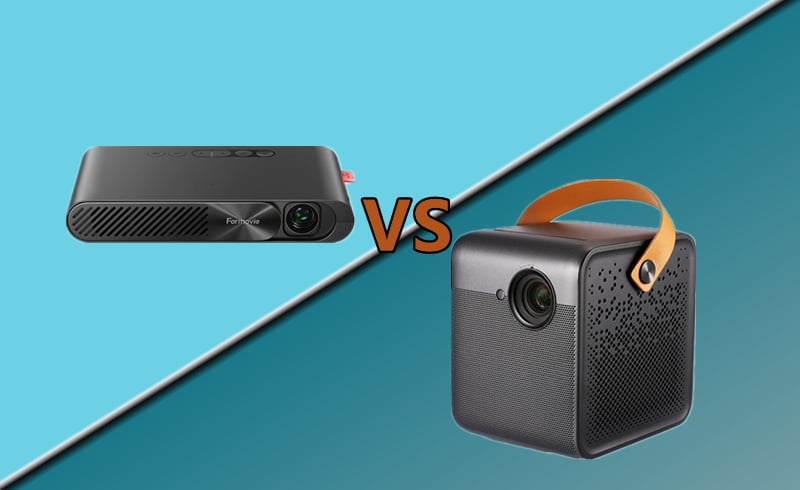



A portable projector has been increasingly popular recently. Formovie P1 and Formovie Dice are both portable projectors released in 2022. In this guide, we will compare the two projectors side by side, helping you to know the differences between the two projectors.
Formovie Dice has a better configuration than Formovie P1 in terms of resolution, system, and connectivity, but Formovie P1 has a smaller size and higher brightness. You can check the side-by-side comparison below.
In terms of appearance, Formovie P1 looks like a small power bank, while Formovie Dice is like a dice. As for color, Formovie P1 is whole black while the Formovie Dice adopts contrasting colors of mineral grey and orange.
Regarding size and weight, the Formovie P1 is relatively smaller and lightweight. Formovie P1 weighs just 0.3kg and you can just put it in your pocket. As Formovie Dice is slightly bigger and heavier, it has a leather handle so that users can carry it conveniently.
The light source of the projector affects many aspects of the projected image, such as brightness, light source life, and color gamut. Formovie P1 are laser-based projector while Formovie Dice is an LED projector. Compared with LED projectors, laser projectors generally have higher brightness and better color gamut.
They have the same lamp life of 25,000 hours, meaning that you can use the two projector for more than 13 years every 5 hours a day.
Resolution and brightness are important parameters of a projector’s picture. In terms of brightness, the Formovie P1 is a bit better because it has 800 ANSI Lumens, slightly brighter than Formovie Dice’s 700 ANSI Lumens. However, these two projectors are not bright enough to be used during the day or in bright light.
Let’s check the resolution of the two projectors. Formovie P1 has 960 x 540 while Formovie Dice has FHD (1920×1080) resolution. The higher the resolution, the crisp the projection image.
As for the image size, Formovie P1 has a max image size of 100 inches while its counterpart has a max image size of 120 inches. The two Formovie projectors both support auto focus, but they are different in terms of keystone. Formovie P1 supports vertical auto-keystone while Formovie Dice supports 4-point keystone.
Most smart projectors are powered by smart systems so that users can stream content on the projector directly and conveniently. Formovie P1 is powered by an Android OS while Formovie Dice operates on Android TV.
The biggest difference between the two systems is that the Android TV system comes with google services, for example, the Google Play store, Google Assistant, YouTube, and more. You can check our previous post on Android TV vs Android OS.
The audio is an integrated part of a good visual experience. The two projectors both have built-in speakers, but Formovie Dice has more powerful speakers.
More importantly, Formovie Dice supports Dolby Audio, which is widely seen in some streaming platforms, such as Netflix, to enhance the audio quality.
The two portable projectors both support Wi-Fi, Bluetooth, and wireless screen mirroring.
As for the interface, Formovie P1 has HDMI 1.4 while Formovie Dice has HDMI 2.0. Compared with HDMI 1.4, HDMI 2.0 has many new features that are not compatible with HDMI 1.4, including HDR, VRR, ALLM, eARC, and more.
Check previous post on HDMI vs HDCP to know the differences between HDMI versions.
For portable projectors, the built-in battery is a key parameter. If a projector has a built-in battery, you can use the projector outside without connecting it to a power supply.
For the two projectors, Formovie Dice has a built-in battery of 16,000 mAH battery with a lamp life of about 3 hours. Formovie P1 has no built-in battery, but it has Type-C charging port, meaning that you can power the projector via a power bank conveniently.
Formovie P1 and Formovie Dice are both good portable projectors. They have their own pros and cons. Formovie P1 has high brightness and a small size, but it is poor in terms of resolution, system, and connectivity. Formovie Dice is bigger and heavier, but it has a built-in Android TV, a built-in battery, and a higher resolution. As the two projectors have a price gap of about $250, you can pick one based on your preference and budget.
Related Posts